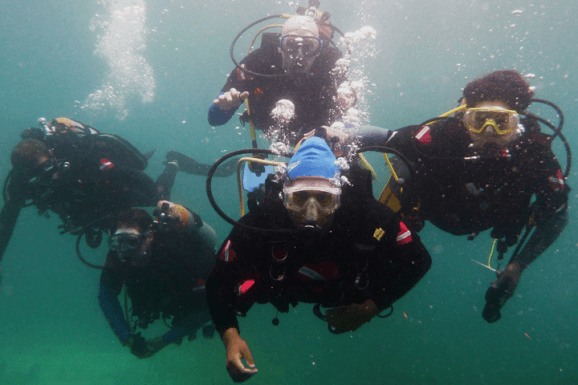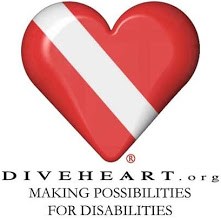 Tinamarie Hernandez is the executive director of Diveheart, a nonprofit organization that’s 16 years old. Their dedicated group works with people with disabilities using scuba diving as a way to improve their lives.
Tinamarie Hernandez is the executive director of Diveheart, a nonprofit organization that’s 16 years old. Their dedicated group works with people with disabilities using scuba diving as a way to improve their lives.
The vision of Diveheart is to instill the “can do” spirit in participants, inspiring them to take on challenges that they may not have considered before. Using zero gravity and the adventure paradigm, we help participants believe that if they can scuba dive they can do anything.
Scuba diving helps build self-confidence and self-esteem and even may improve the diver’s mobility and give some relief from pain. We call it scuba therapy.
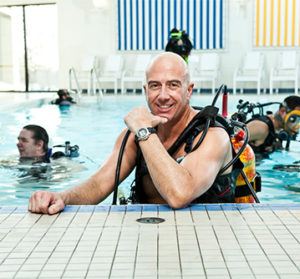
Diveheart founder Jim Elliott combined his love for diving and his passion for helping people with disabilities to create a life-changing adaptive scuba diving program
Diveheart was founded by Jim Elliott in 2001, although he had already been working with people with disabilities for several years. Jim’s daughter, Erin, was born blind and struggled to become a part of the community. But, all that changed when Jim heard about adaptive downhill skiing. Erin began participating and Jim joined a parent group who worked with people with disabilities on downhill skiing, and he also became a guide for blind skiers.
An Idea is Born: Adaptive Scuba Therapy
Jim always loved scuba diving. When he saw the benefits that Erin received from becoming an active downhill skier, he wondered how his love of scuba diving might also help people with disabilities. He not only saw benefits for Erin, but another daughter, Mareen, who has scoliosis, as well as his father who also had a disability after serving in Vietnam.
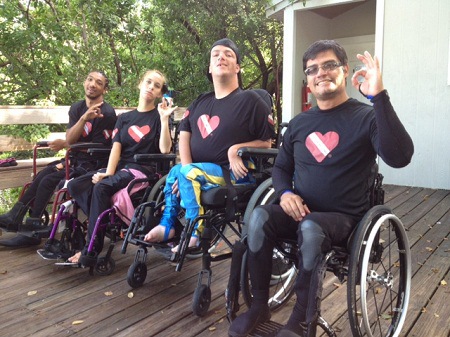
One of the unique advantages of scuba diving is that movement isn’t affected by gravity.
The commitment to improve the quality of life for this community was personal for Jim. So, he followed his heart and started Diveheart with the belief that when people with disabilities learned to scuba dive, their confidence, self-esteem and independence would grow.
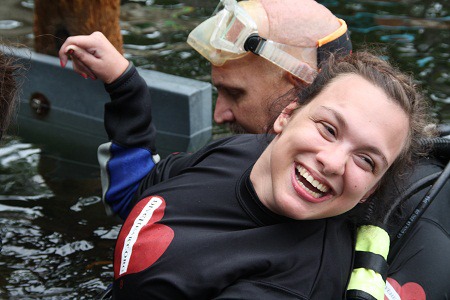
Diveheart: making waves worldwide
As Diveheart expanded, Elliott was invited to China to demonstrate the benefits of scuba diving for people with disabilities. Today, Diveheart centers are located around the world with teams in the United States, the United Kingdom, Malaysia, Singapore and the Philippines. Diveheart also has trained instructors in Cozumel, Mexico, the Grand Cayman Islands and Utila, Honduras. In the U.S., the organization has trained divers and buddies at Rainbow Reef in Key Largo.
Jim Elliott has taught scuba divers and scuba instructors all over the world how to teach adaptive scuba diving and how to train buddies to dive with people with disabilities.
VIDEO: CNN FEATURED DIVEHEART on the great big story tv show
The benefits of scuba therapy are becoming well-known worldwide, with numbers of adaptive scuba instructors and buddies growing all the time.
Many are not even associated with Diveheart, although some certainly may have been educated through the efforts of Jim Elliott and his program.
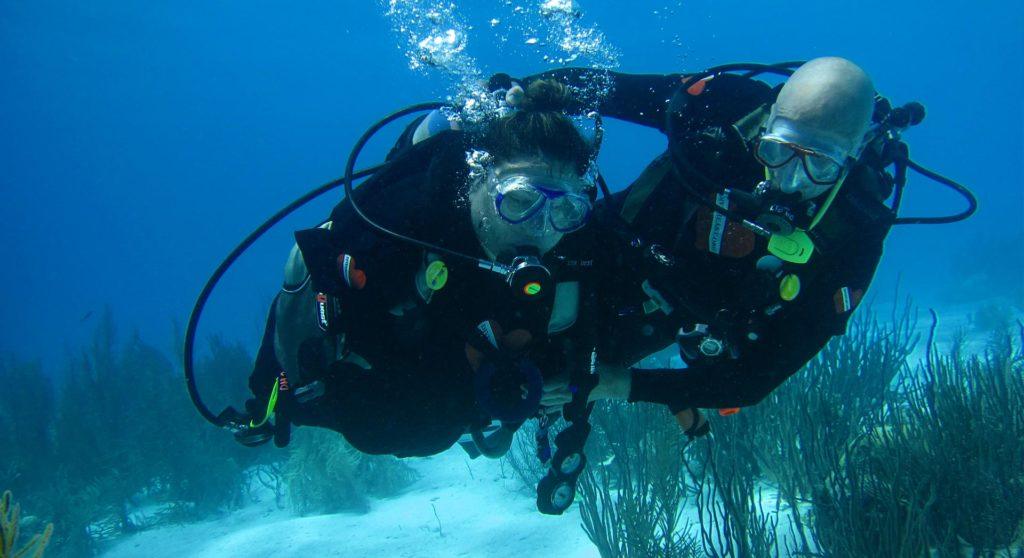
Who benefits from Adaptive scuba and how does diveheart work?
Tinamarie Hernandez has been the executive director of Diveheart for three and a half years and is dedicated to enriching the quality of life and human spirit for the individuals they serve.
“We will work with any person who has a disability, as long as they don’t have a medical reason that prevents them from scuba diving. Diveheart works with people too who have cognitive as well as physical disabilities.”
Tinamarie shared about the diverse teams and passionate divers that work directly for the organization. Recently, Diveheart launched a new team in the Metro Washington DC area. “Once this team is trained, its members will provide a monthly program. We also have a team in Atlanta, Georgia, two teams in Florida – one in south Florida and one in the Tampa Bay area – and a southern California team. We’re working on getting a northern California team going.
Our largest team is in Chicago, Illinois, where Diveheart began. Most of our work with people with disabilities is where we have access to swimming pools to teach them how to scuba dive.”
The folks at Diveheart are sensitive to the fact that many people with disabilities may not be able to take long trips to exotic locations to scuba dive. But, they’re committed to finding ways to get everyone in the water.
“We still can give a person with a disability the training and the essence and the freedom of scuba diving in a swimming pool. Diveheart offers the Diveheart Scuba Experience Programs where people with a disability can come to a swimming pool, get in the water with equipment and swim around underwater with an adaptive buddy for free with no limit placed on the number of times a person can participate,” Tinamarie adds.

Ever dreamed of becoming a certified scuba diver? Diveheart is ready to help.
Tinamarie says if someone with a disability wants to become certified to go on scuba diving trips or maybe dive in a rock quarry, a freshwater location or the ocean, that student can take lessons to become a certified scuba diver. The costs of those lessons depend on what the instructor charges.
Diveheart will help that individual with a disability fundraise or jointly fundraise with him or her.
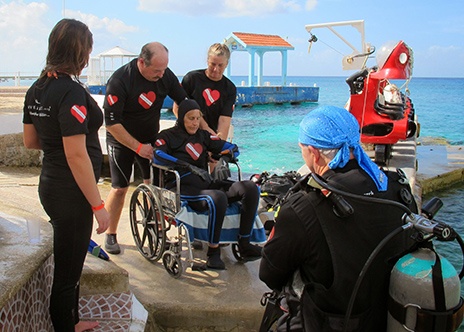 Many times, by starting early, Diveheart can help raise the money to pay for the lessons and/or the trip too. “Often Diveheart programs create a problem for the person with the disability and for Diveheart,” Hernandez reports as she smiles, since, “Once a person goes on one of our trips, they want to go again and again.”
Many times, by starting early, Diveheart can help raise the money to pay for the lessons and/or the trip too. “Often Diveheart programs create a problem for the person with the disability and for Diveheart,” Hernandez reports as she smiles, since, “Once a person goes on one of our trips, they want to go again and again.”
Diveheart Scuba Divers Explore New Worlds
People often make very wrong assumptions about what people with disabilities can and can’t do. But adaptive scuba diving can really shake up that stereotype.
Tinamarie talks about how the conversation can shift when someone with a disability mentions that they scuba dive. The person without the disability is forced to challenge their original assumptions.
Tinamarie says, “The stereotypes vanish. The perception of the person with the disability changes when another individual realizes that this person can do something daring most people can’t do and even that may be considered impossible for someone in a wheelchair, on a walker or some other type of adaptive device to do. Diveheart people are amazing.”
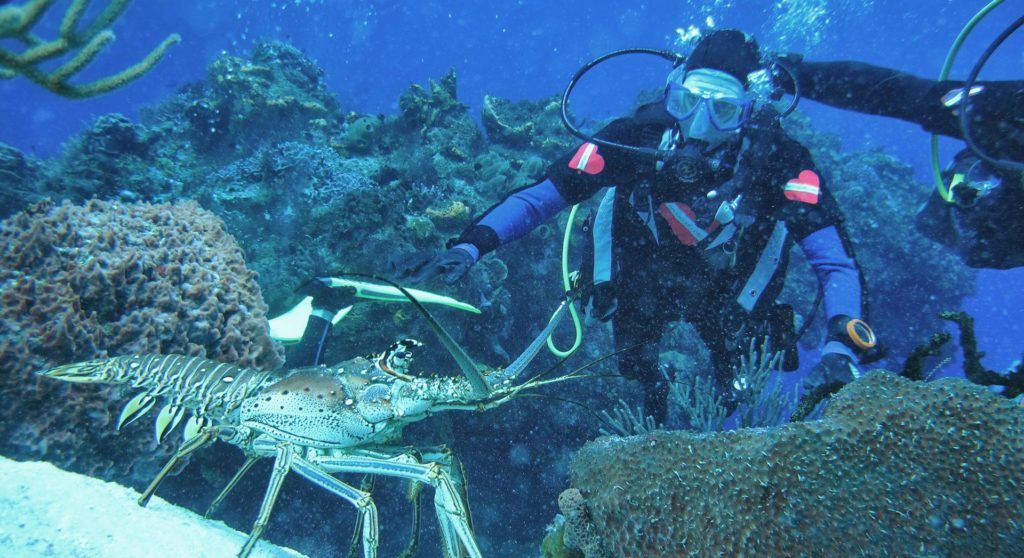 Some Diveheart participants go down to see what’s underwater, while others video their underwater experiences. Diveheart scuba divers may go as deep as 70 feet, but others only may go as deep as 30 feet. Diveheart divers in the Grand Cayman Islands and Honduras have even enjoyed exploring underwater shipwrecks.
Some Diveheart participants go down to see what’s underwater, while others video their underwater experiences. Diveheart scuba divers may go as deep as 70 feet, but others only may go as deep as 30 feet. Diveheart divers in the Grand Cayman Islands and Honduras have even enjoyed exploring underwater shipwrecks.
Success Stories from Diveheart’s Adaptive Scuba Therapy
Diveheart also sponsors trips for people with disabilities and their families. Matthew Wagstaff started with the Diveheart pool experience and got certified as a scuba diver. Wagstaff’s dad and brother then became certified as scuba diving buddies for people with disabilities.
Today Matt, his father and his brother have gone on diving trips with and without Diveheart. A full-time wheelchair user, Matt feels like scuba diving is hands-down the most accessible outdoor, adventurous activity he can participate in alongside his family.
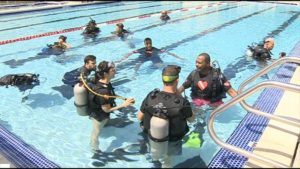
Diveheart participants are instructed on adaptive scuba diving
Hit by a car just before his deployment with the U.S. Marine Corps, Greg Rodriguez became an incomplete quadriplegic. He was introduced to Diveheart after rehab and while using a wheelchair and Greg says Diveheart changed his life. The program had a major positive impact on the way he thought about himself and the way he perceived what life had to offer him. Because of the exercise program he participated in while learning to dive and the strength of character that he built through Diveheart, Greg’s mobility greatly improved and he was able to eventually begin using a walker, then a cane. Two years ago Greg walked and finished a 5K race. He’s loving his active life and has attended a number of scuba diving trips with Diveheart.
Amber Rangel, an incomplete quadriplegic, had been a world-ranked barefoot water skier before her accident. After hitting the water incorrectly on a practice jump, and technically drowning, she woke up in the hospital paralyzed. Like many newly injured patients, Amber experienced a period of depression and fear of what life would be like as a quadriplegic. But, she has once again found her calling. This May, Amber departed for a 3 week stay in Utila, Honduras, to inspire people with disabilities to learn to scuba dive, as well as to enjoy a little scuba diving herself. She’s working with the Bay Islands College of Diving and with individuals who will be training to be scuba diving buddies for people with disabilities.
Jody Seal was an adaptive scuba diving buddy at Triumph Foundation Festival
At the Triumph Foundation Wheelchair Sports Festival for spinal cord injury survivors, many adaptive sports, including rugby, hockey, basketball, racquetball, handcycling, WCMX, baseball, pickleball and power chair rodeo were available for SCI individuals to try. One of those sports was scuba diving.
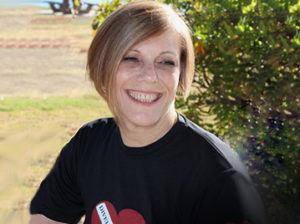
Jody Seal leads Diveheart’s Southern California Team
Jody Seal, an Advanced Buddy and the Lead of the Southern California Diveheart Team, took people in wheelchairs scuba diving in a swimming pool. ”Diveheart has 17 scuba divers who are part of the team, and seven of those divers introduced people in wheelchairs to scuba diving at this festival,” Jody reports. “We had five adaptive divers in the water, with four of them paraplegics and one a quadriplegic. I’m not sure who had the better time – the scuba diving buddies – or the people who dove with us.”
“I saw an awful lot of smiles when each diver returned to the surface after experiencing weightlessness and the freedom of movement that scuba diving provides.”
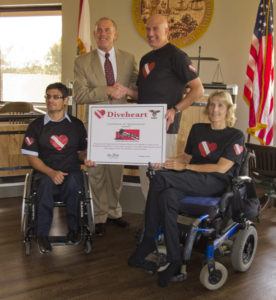 Scuba diving gives people in wheelchairs an opportunity to do something different from their daily routines. One of the participants at the sports festival was a Mom with two teenaged children. Jody later sent the Mom pictures from her dive in an email, and the Mom wrote back that one of the most exciting parts of her dive was having her children see what she could do underwater. Jody shared, “Now the entire family wants to become scuba divers, so they can participate in this outdoor activity.”
Scuba diving gives people in wheelchairs an opportunity to do something different from their daily routines. One of the participants at the sports festival was a Mom with two teenaged children. Jody later sent the Mom pictures from her dive in an email, and the Mom wrote back that one of the most exciting parts of her dive was having her children see what she could do underwater. Jody shared, “Now the entire family wants to become scuba divers, so they can participate in this outdoor activity.”
Jody has spent her entire life working with folks with developmental disabilities and teaching them independent living skills, activities of daily living, adaptive computer skills and job preparation skills. Twenty years ago Jody became a scuba diver and after meeting Jim Elliott she realized she could take her calling in life of working with people with disabilities and her passion for scuba diving and use both through the Diveheart program.
Jody explains, “This Diveheart program gives me so much joy that I can’t imagine doing anything that’s better than this. The Diveheart program is what I was meant to do.”
Diveheart’s Adventure Dives for Certified Adaptive Divers
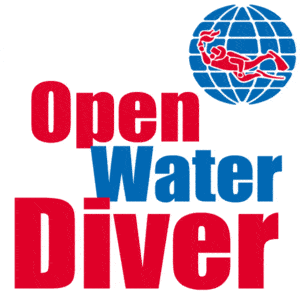 Diveheart posts the dates and the costs of its trips at here and on Diveheart’s social media platforms Diveheart plans about six or seven big trips a year for adaptive scuba divers (and may have additional trips to Bonaire in the Caribbean). On most trips, there will be from three to 11 adaptive scuba divers. Each diver brings along his/her own caregiver for the trip and Diveheart provides the adaptive diving buddies.
Diveheart posts the dates and the costs of its trips at here and on Diveheart’s social media platforms Diveheart plans about six or seven big trips a year for adaptive scuba divers (and may have additional trips to Bonaire in the Caribbean). On most trips, there will be from three to 11 adaptive scuba divers. Each diver brings along his/her own caregiver for the trip and Diveheart provides the adaptive diving buddies.
We’ve discovered the forgiving, weightless wonder of the water column provides the perfect gravity-free environment for those who might otherwise struggle on land. Underwater, we’re all equal.
From the very beginning of Diveheart, Jim Elliott knew that by helping people with disabilities learn to scuba dive that there were benefits for the instructors/buddies and the adaptive diver. He recognized that a person with a disability who scuba dives also can change the perception that most of the world has of people with disabilities, especially people in wheelchairs.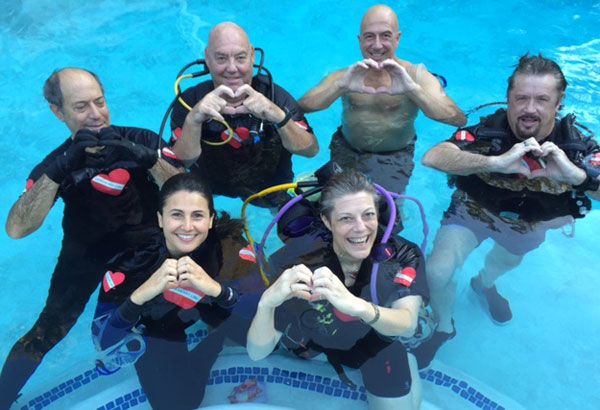
To learn more about becoming an adaptive scuba diver through Diveheart, visit their website or email Tinamarie. You can also connect with them on Facebook and LinkedIn, or look them up on YouTube (Diveheart on NBC, Stories of Courage).
We hope you enjoyed this article for the Cure Nation!
-
Enjoy Our Free Resources & Articles
 CURE NATION is designed with you in mind, to offer assistance and education when you need it through a personal support program.
CURE NATION is designed with you in mind, to offer assistance and education when you need it through a personal support program.All of the information you find below and on our related social media pages is meant to guide you to places, topics and, resources that enhance your life, while also connecting you with a growing group of friends.
- Sign up for our free, CURE NATION e-newsletter to have our latest stories delivered directly to you, once a month.
- Get our FREE LIFESTYLE + TRAVEL BOOKS here.
- Have an idea you’d like to share? Let us know.
- Be sure to take a minute to meet our Cure Advocates too.
You may also enjoy:
Hit the Waves with Stoke for Life Adaptive Surfing
Hurting? The U.S. Pain Foundation Helps People Who Have Chronic Pain
Christopher Block Finds Freedom in Scuba Diving After SCI
4 Quick Tricks to Improve Your Home Accessibility
Wheelchair Dance Teacher Erica Graser-Gates is Rolling with Rhythm
Kristina Rhoades Rocks & Rolls with Zac Brown's Sir Rosevelt "Share a Code" Concert
Arlene Long Shares Her Love of Community!
Hurricane Harvey Won't Stop PVA Games Champion "Wheelchair Willie" Hendrickson

